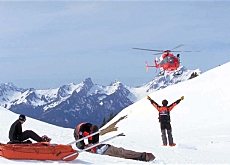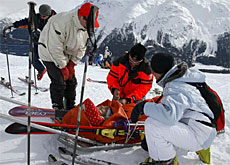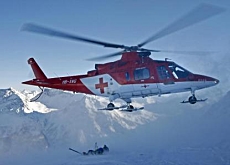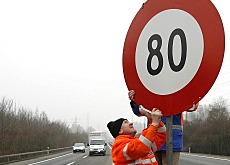Winter sport accidents reach record high

Ski and snowboard accidents for the beginning of 2006 are up by a third on last year, reports the Swiss air rescue service, Rega.
It blames the increase on more people being on the slopes and ski conditions that allow people to go faster. Smog could also be a factor.
Confirming reports in the Sunday media, Rega said on Sunday that it had carried out 705 rescues in the first six weeks of the year, compared with just 528 last year.
This year’s figure surpasses the 2003 record of 652 accidents, said Rega spokesman Walter Schneibel.
Schneibel said there were more people out skiing and snowboarding this year and the snow had become hard, which allowed for higher speeds.
This accounted for a higher accident rate and for the fact that the accidents were generally more serious, said Schneibel.
Air-Glaciers, a private helicopter rescue service covering canton Valais, most of the Bernese Alps and the Franco-Swiss Portes-du-Soleil skiing region, also reported more accidents this year.
The company said that it had carried out 575 rescues this year, 120 more than in the same period last year.
More patients
According to the SonntagsZeitung newspaper, hospitals have also confirmed the rise in winter sport patients.
At the regional hospital in Interlaken, there has been a 20 per cent rise in accident patients, with a notable increase in serious fractures and injuries in the rib, thigh and knee areas.
This has also been the case in hospitals in many other skiing regions, said the newspaper.
The figures come as some ski resorts introduced measures earlier this year aimed at making skiing safer, such as more training for ski patrol units and, in one resort, an experimental speed limit on one of the pistes.
Experts quoted in the SonntagsZeitung said that winter smog could also account for the higher number of accidents.
The poor air and foggy conditions in the lower regions of the country could have encouraged more people onto the clearer slopes.
“At weekends it gets very crowded on the slopes in many areas,” Hans Jacomet, the head doctor at Rega, told the SonntagsZeitung. “This leads to more accidents.”
swissinfo with agencies
Rega is an independent, non-profit foundation and a corporate member of the Swiss Red Cross. It was founded in 1952. It employs 180 people and has 13 helicopters and 3 planes.
Rega’s head office is at Zurich’s Kloten Airport. Its 10 bases are distributed throughout Switzerland so that helicopters can reach the scene of the accident within 15 minutes of the alarm being raised, with the exception of canton Valais.
Air-Glaciers was founded in 1965 in Valais. It employs 130 people and has 21 helicopters and 8 planes. It also does tourism flights.
It is based at Sion and has 7 bases in Valais, Geneva and in the Bernese Oberland.
So far in 2006 Rega has carried out 705 rescues.
In 2005 during the same period, it was 528.
The 2006 figure beats the previous record in 2003 of 652.
Air-Glaciers has carried out 575 rescues so far in 2006.
This is 120 more than in the same period last year.

In compliance with the JTI standards
More: SWI swissinfo.ch certified by the Journalism Trust Initiative



You can find an overview of ongoing debates with our journalists here. Please join us!
If you want to start a conversation about a topic raised in this article or want to report factual errors, email us at english@swissinfo.ch.